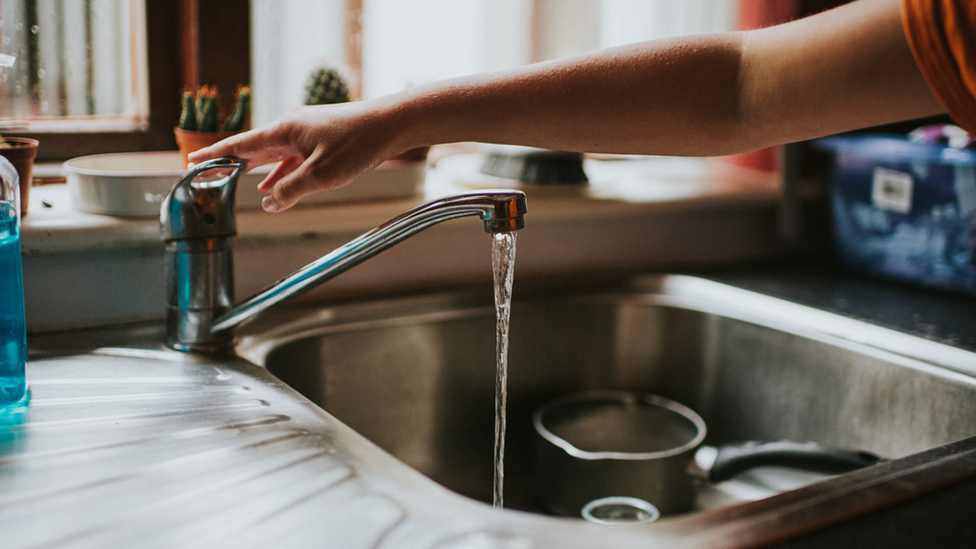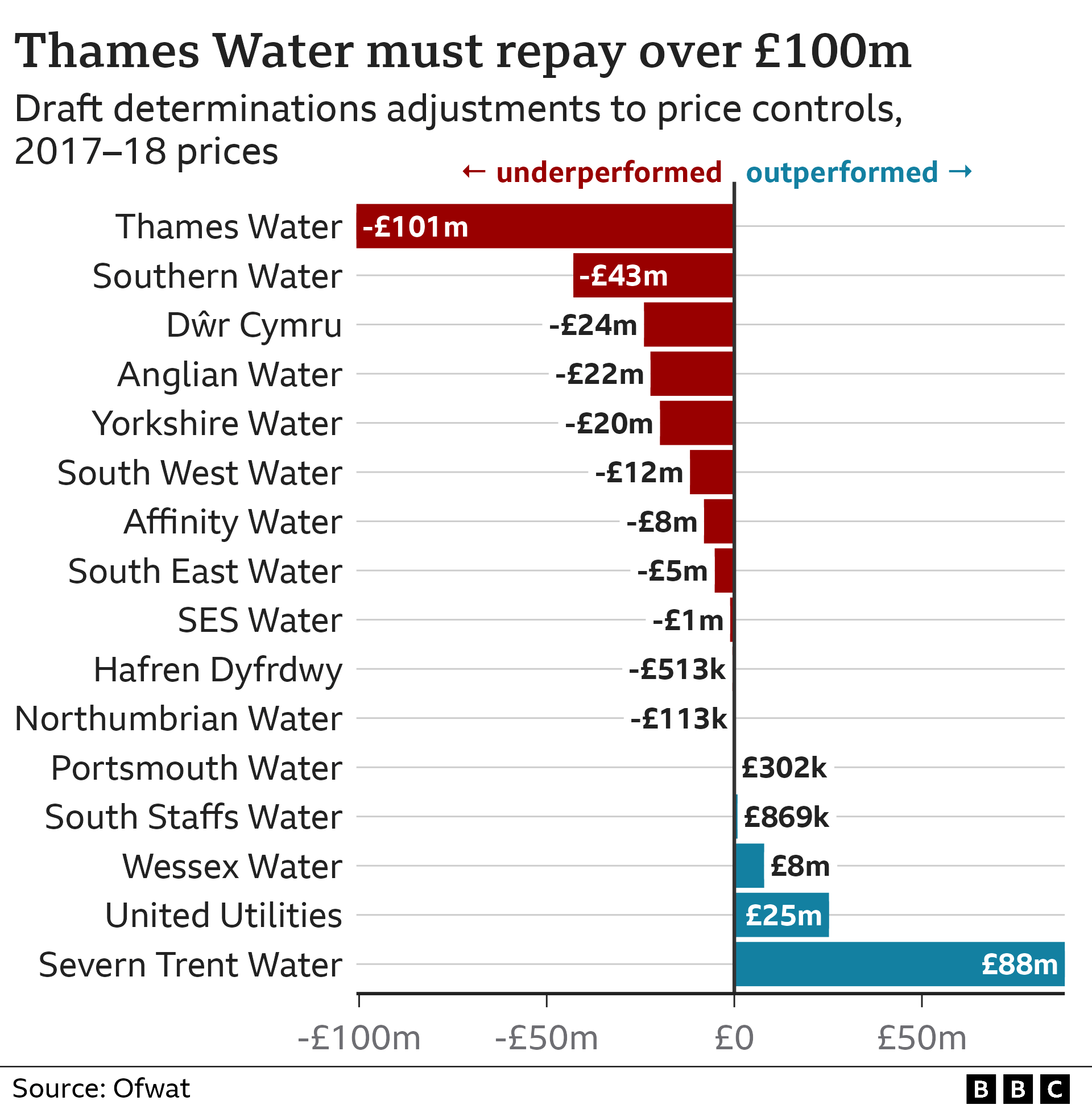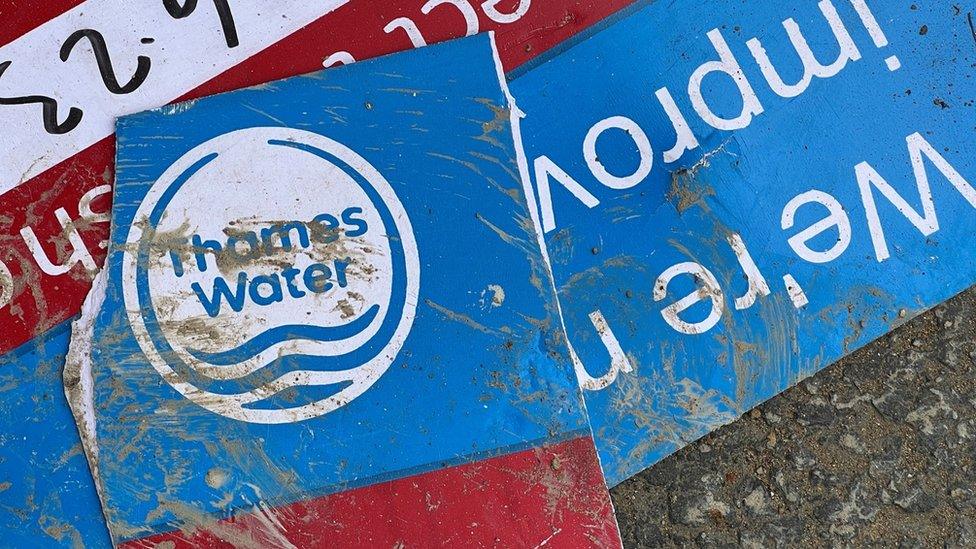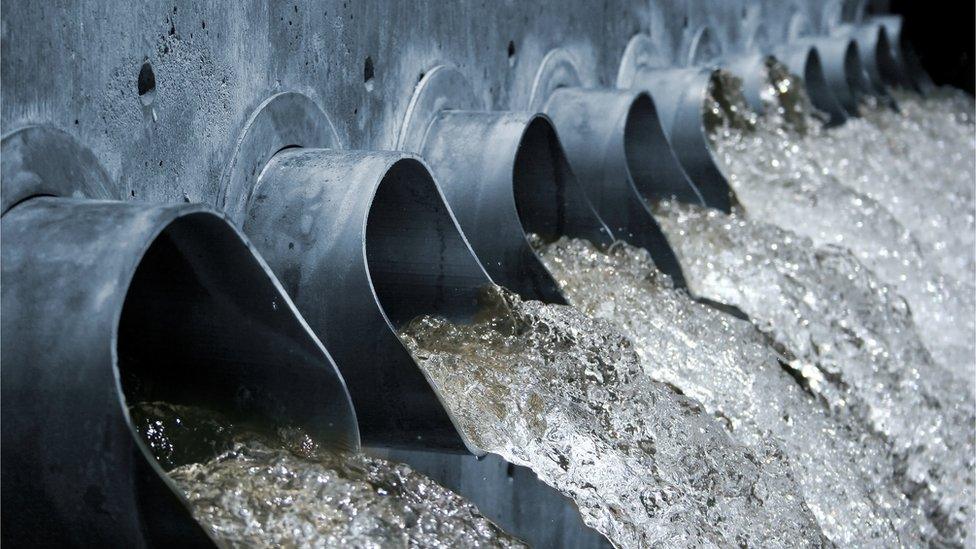Water firms forced to pay back customers for poor performance
- Published

Water companies have been ordered to pay back £114m to customers through lower bills after missing key targets.
Ofwat, the industry regulator, said that firms are "falling short" on performance measures around leakages, supply and reducing pollution.
It said that following a review, millions of pounds would be returned to households by cutting bills.
Ofwat said in its assessment that not one company reached the highest measure of performance.
Dŵr Cymru, Southern, Thames, Anglian, Bristol, South East and Yorkshire Water fell into the lowest category of "lagging" and the remaining 10 were rated "average". None were considered "leading".
The regulator judges water companies in England and Wales against "stretching" targets set in 2019 for a five-year period.
If they fail to meet targets, Ofwat restricts the cash that they can take from customers.
All but five of the water providers reviewed will have to give money back to customers by reducing their bills in 2024-25, rather than each bill payer getting a lump sum refund.
The companies that will have to cut bills are:
Affinity Water
Anglian Water
Dŵr Cymru
Hafren Dyfrdwy
Northumbrian Water
SES Water
South East Water
South West Water (South West area)
South West Water (Bristol area)
Southern Water
Thames Water
Yorkshire Water
It is not yet possible to say how much each customer might see their bill reduced by, as the figures are provisional and will depend on where they live and inflation.
Customers at other companies might see their bills go up. Any changes will be applied automatically although it may not show up as a separate line on bills.
Ofwat chief executive David Black said that while any reductions "may be welcome to bill payers, it is very disappointing news for all who want to see the sector do better".
The regulator also found that customer satisfaction has been falling.
"It is not going to be easy for companies to regain public trust but they have to start with better service for customers and the environment," Mr Black said.
Water UK, the industry body, said that companies recognised there was "still much more to do to meet the regulator's ever-tightening targets".
Thames Water must return the most money - more than £101m - followed by Southern Water, which must pay out £43m.
Thames Water serves 15 million people with water and wastewater and has been struggling under a huge debt pile.
Shareholders agreed to provide an extra £750m in funding in July as it fought off the threat of government control and faced criticism over sewage discharges and leaks.
"We're making progress and we'll continue to engage and work with Ofwat as we implement our plan," a Thames Water spokesperson said.

The total amount the industry must pay out has been offset by a few companies being allowed to charge more for improving their performances.
The £114m being returned to customers takes into account the fact that some companies, including Severn Trent and United Utilities, will be allowed to charge their customers more in the next financial year, having delivered a sufficient service.
Severn Trent Water will be allowed to charge £88m more across all of the 4.6 million households and businesses it serves, while United Utilities will be able to charge an extra £25m.
Ofwat said it was investigating all 11 water and wastewater companies and there were live enforcement cases for six of them for potential failures on sewage discharges into the environment.
It is also looking into Dŵr Cymru and South West Water, questioning the accuracy of their reporting on leakages and consumption.
Mike Keil, senior director at the Consumer Council for Water, said: "Customers are tired of not getting the service they deserve for the things they care about.
"It's right and fair that people get their money back when they don't receive the services they were promised by some water companies. People want assurance that their water bill is good value for money."

How are water bills calculated?
Water bills can cover a range of things, from water supply and sewerage to highway drainage.
How your water bill is calculated depends on whether or not you have a water meter and where you live.
For those that do not have a meter, bills are not based on how much water you use. It is usually comprised of a fixed, or "standing" charge that covers administration costs such as billing, as well as a charge based on the rateable value of your home.
This value is based on your local authority's assessment of the rental value of your home, but this rating took place between 1973 and 1990.
People who have a meter are billed for the exact amount of water used.
Bills will typically show how much water has been used and will multiply that by the charge per cubic metre (1,000 litres) of water.
Fixed charges are then added - again for things like reading and maintaining meters as well as processing payments.
If you are entitled to any adjustments, including for those on a low income, these are then subtracted.

Environment Secretary Therese Coffey said Ofwat's latest report on the industry was extremely disappointing.
"While I acknowledge there is good work ongoing in some companies - cleaning up waterways and investing in vital infrastructure - there is simply not enough of it. The fact that not a single water company is classified as 'leading' is unacceptable.
"Our water and sewerage systems are highly complex and under increasing pressure - but that is no excuse," she said, adding that her department had written to the bosses of each company in the lowest category of the regulator's report.
The Department for Environment, Food and Rural Affairs said on Monday that it was providing more money to reduce the amount of times sewage is pumped out of storm overflows, adding another £4bn on to the £56bn it announced last year.
Water firms have faced extensive criticism over the last few years about the high number of raw sewage discharges and the impact on the UK's waterways.
A recent BBC investigation found that three of the biggest water companies were suspected of discharging sewage into waterways on dry days in breach of their permits.
Labour shadow environment secretary Steve Reed said that Ofwat's report demonstrated "the complete failure of water companies to act on the sewage scandal".
A spokesperson for Water UK said that "ensuring the security of our water supply in the future while protecting the environment will take significant investment", adding that firms in England and Wales will set out detailed plans on investment next week.


What ongoing water issues have you experienced in your area? Tell us by emailing: haveyoursay@bbc.co.uk, external.
Please include a contact number if you are willing to speak to a BBC journalist. You can also get in touch in the following ways:
WhatsApp: +44 7756 165803, external
Tweet: @BBC_HaveYourSay, external
Or fill out the form below
Please read our terms & conditions and privacy policy
If you are reading this page and can't see the form you will need to visit the mobile version of the BBC website to submit your question or comment or you can email us at HaveYourSay@bbc.co.uk, external. Please include your name, age and location with any submission.
Related topics
- Published9 July 2023

- Published9 March 2022
